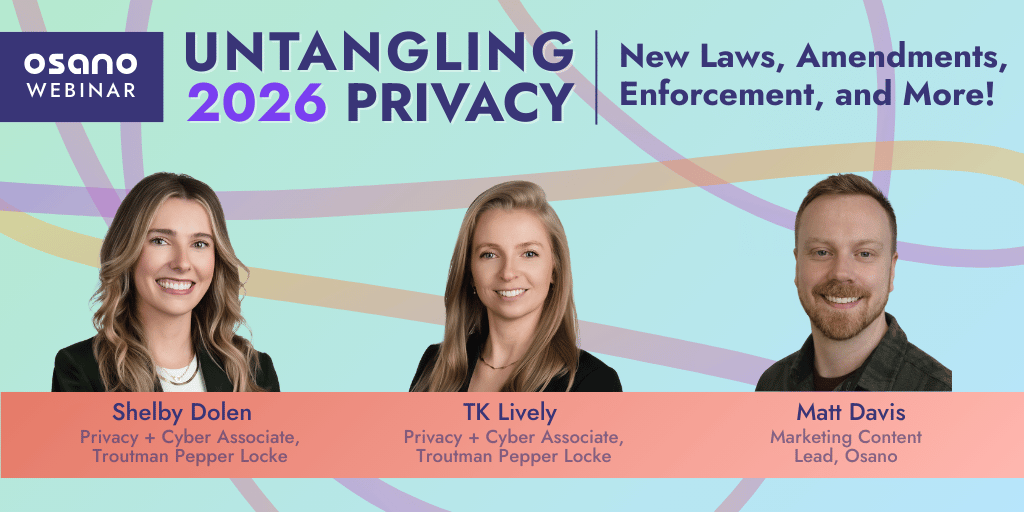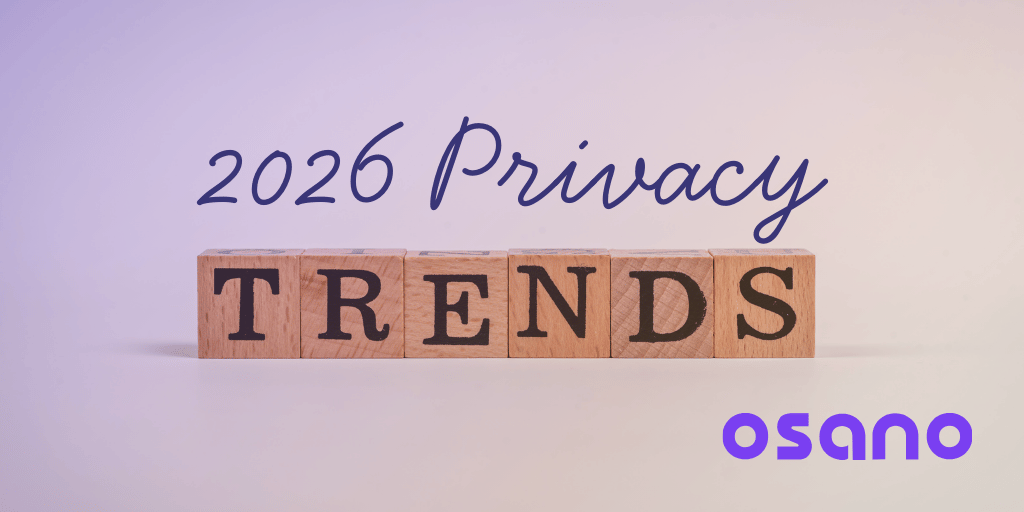Information has always been a form of currency in society—from buying favors to building connections and generating financial gain.
Businesses rely on information; now more than ever. The more data you have from your consumers, the more you can offer, customize, and sell. In short, data helps your bottom line.
But, with consumer data comes data responsibility. This responsibility requires you to manage consumer data in line with data privacy and security regulations. These laws and regulations require you to collect, manage, and use personal data responsibly and securely, with proper data storage practices that align with compliance standards.
Yes, that means you must both protect it from threats and store and process it according to the data subject’s wishes, adhering to the principles of the General Data Protection Regulation (GDPR).
If you fail to comply with consumers’ data rights or are found to not have taken appropriate security measures, you can face legal repercussions. Plus, it’s not just a data privacy compliance issue; your reputation determines whether consumers trust you with their information or not.
So, what exactly are data privacy and security? How are they different, and what makes them similar?
Let’s find out.
We’ve discussed how data security and privacy differ in this older post, but let’s quickly recap.
Data Privacy and Its Importance in Data Governance
An individual’s personal information requires careful and mindful handling. They may share it with you, but you have to respect it and not take it for granted. You also must follow their wishes on how you use it. Privacy regulations are how this arrangement is formalized.
Data privacy deals with what consumer information you need, why you need it, how you handle that information, what rights consumers retain over that information, and who can access it.
Even though your organization stores it, the data belongs to the consumer who gave it to you.
They must be told that you’re collecting their personal information and why. In some cases, they must agree to let you collect their data (i.e., give affirmative or opt-in consent). In others, you only need to inform them of the collection and give them the choice to opt out of that collection (known as implicit or opt-out consent).
Since they have privacy rights over their information, they should be able to view and verify that the data is accurate and up to date and amend it if it’s not. If they ask you to, you must delete their personal information from your system.
They should know who you’re sharing the information with. If they don’t want you to share that data, then you must stop sharing or selling it. It’s important that their personal data is kept confidential and only available to those authorized to see it.
In short, data privacy is how your business protects the rights of consumers when it comes to their personal information.
Why Is Privacy Important?
Data privacy laws govern how you deal with consumer data, and violating those laws can result in hefty fines. However, as a business, you should protect your audience’s personal information because it’s the right thing to do. Consumer personal information often includes data such as:
- Financial details, such as social security numbers, bank account details, transaction histories, etc.
- Personal health information (PHI)
- Dates of birth
- Addresses
- And more
This information is private and should be treated as such. Information privacy protections ensure that it’s only accessible to the people who need it and that those people handle it in an ethical way. Having them in place tells your consumers they can trust you with their information.
If you don’t have adequate protection, you’ll find more and more users opting out of giving you their data. That’s if you don’t lose their business altogether.
That’s not the worst of it; if you’re found to have been mishandling consumer data, or if there’s a data breach that could have been prevented, you will be fined.
In short, data privacy is important because it’s the right thing to do, it helps you instill trust in your consumers, and it keeps you compliant.
Data Security and Its Role in Restricting Access to Data
So, you’ve determined what information you need from your customers and got their consent to process it.
But, how will you safeguard it? How will you prevent the wrong people from viewing and misusing it? If someone does try to steal it, do you have a way of detecting this attempt and blocking it?
That’s what data security focuses on. This aspect of data governance aims to protect consumers’ personal data from cyber attacks, breaches, and unintended access. It does so through robust data protection strategies, such as identity and access control, systems and network security, and protocols that encrypt data and safeguard information both in transit and at rest.
Why Is It Important to Protect Data?
According to TechCrunch, there have been over 1 billion records stolen through data breaches in 2024, and the number continues to rise. A report from IBM states that the cost of data breaches in the US this year has been $4.88 million.
Investing in security can help you avoid the penalties associated with a data breach, but it can also help protect you from penalties associated with data privacy non-compliance. If a bad actor manages to get access to your consumer data, it might be due to circumstances out of your control or because you handled, processed, and used data non-compliantly. If it's the latter, not only do you suffer the direct costs associated with the incident, such as interruption in your service or loss of trust with users, but data privacy authorities can levy hefty fines for non-compliance.
How hefty?
The California Consumer Privacy Act (CCPA) can impose a fine of $7,500 per violation and, under certain circumstances, allows consumers to sue the business for the amount of monetary damage they suffered or statutory damages of up to $750 per incident.
This year, the FTC imposed a penalty of $2.95 million on Verkada, a cloud-based building security solutions provider, for data security and CAN-SPAM violations. Note that this penalty was applied after a data breach revealed Verkada’s numerous security failures.
Data security is necessary to keep your business data confidential, unaltered, and available. You’ve stored this information because you need it. Security is what keeps it safe, protected, and usable.
You also have a reputation to protect. If your business can’t secure the information of your customers, why would they want to share it with you?
Data Privacy vs Data Security: The Similarities
Both data privacy and data security fall under the data management umbrella. Following privacy practices compels you to assess the impact of exposure, what information you need versus what's nice to have, and the data lifecycle from collection to deletion once it's no longer needed.
Comprehensive data protection measures safeguard data from unauthorized access while implementing security practices for handling data.
Even though data security and data privacy are two separate processes, there are some overlaps in their roles.
Both Safeguard Data
Privacy and security are both geared toward keeping your organization’s sensitive information safe from misuse and unauthorized access. The former does it by forcing you to evaluate what information you can and should store, while the latter does so with technical and legislative safeguards.
Both Mitigate Risk
Data use comes with risks. If you collect, process, or store information, you face information security and privacy concerns, including data loss, identity theft, and unauthorized data exposure. All of these can lead to penalties, especially if it’s personal information of consumers at stake.
Robust data security measures reducing risks sounds logical, but how does data privacy help? One of the core principles underpinning data privacy guidelines is data minimization.
According to this principle, you must only collect information that you need and nothing more, which means you’ll have less to store and protect. Thus, even if there is a data breach, you’ve limited the amount of consumer information that threat actors can steal from you.
Both Help with Privacy Compliance
You must have heard of the GDPR. It—along with other data privacy regulations issued by various states, such as California’s CCPA—outlines how you should collect and protect personal data. Drafting a strong security and data privacy framework for your business helps you stay compliant with these laws.
Both Are Essential for Building Trust
Any relationship—even a business relationship—is built on trust. Would you trust a friend after they brought random strangers into your house and one of them stole your wallet?
Probably not, right? So why expect customers to trust you if you can’t keep their sensitive data safe?
On the other hand, if you can keep their data from prying eyes and keep it safe in accordance with their consent, they will be more likely to do business with you.
Best Practices for Ensuring Data Privacy
While data privacy laws do provide guidance, you may want to consider building an internal privacy policy for your business data.
There are several elements that make a good data privacy program. Here are some best practices to help you create one:
Inventory and Classify Types of Data
To protect something, you first need to know of its existence and location. That’s why you need to know what data you have, how and where it’s stored, and how you handle it. Once you’ve discovered your data, it should be classified as well.
Data classification is when you rate it in order of sensitivity and importance. Sensitive personal data needs more protection than other types.
Finally, you need to decide how often you carry out the inventorying process. This is something you must do periodically because you’re continuously collecting data and adding it to your systems.
Minimize Data Collection
We know data is power, and with great power comes great responsibility. The more you collect, the more you need to manage and protect. That’s why data privacy best practices recommend minimizing your data collection.
Only collect what you absolutely need. This isn’t just great for privacy, but it also reduces your risk. You can’t accidentally expose data in a breach if you aren’t processing that data in the first place.
Be Transparent with Your Customers
Consent is a major part of data privacy. For valid consent, the consumer must know what you’re collecting and how it’ll be used, among other information. Clear privacy notices inform them of your intent and the purpose of collection.
This notice should ideally offer the customer the option to opt out of data collection altogether and also allow them to decide what they’re comfortable sharing. The more power you give your customers over their data, the more they will trust you.
Invest in Privacy Management Software
When you invest in data privacy—true and comprehensive data privacy—you’ll find compliance can involve tedious and time-consuming work.
Platforms like Osano make managing data and your customers’ privacy so much easier. You can automate data mapping, consent management, data subject access request (DSAR) processes, privacy impact assessments (PIA), and so much more.
They also manage compliance for you. If your business is spread across multiple states or countries, you must comply with each jurisdiction's regulations by protecting data. An automated platform will be able to do that for you.
Intrigued? Find out more about what our data privacy management platform can do for you.
The ROI of Privacy Management
Curious about what benefits privacy management can bring to your business? Download the ebook and find out today.
Download Your Copy
Osano Staff
Osano Staff
Osano Staff is pseudonym used by team members when authorship may not be relevant. Osanians are a diverse team of free thinkers who enjoy working as part of a distributed team with the common goal of working to make a more transparent internet.
.webp?width=1220&height=1090&name=Osano-guarantee-seal%20(1).webp)



